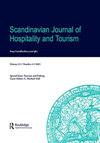Sustainable behaviour in tourism and hospitality
IF 3.6
4区 管理学
Q2 HOSPITALITY, LEISURE, SPORT & TOURISM
Scandinavian Journal of Hospitality and Tourism
Pub Date : 2021-10-20
DOI:10.1080/15022250.2021.1984986
引用次数: 0
Abstract
This special issue collects research on how actors in the tourism and hospitality supply chain can be encouraged towards sustainable behaviour by connecting to their values. In line with Schwartz’s (2012) value theory, values are interpreted as guiding principles in life. Recognising the need for a coordinated effort among different constituencies in the transition toward a more sustainable future, the call was not limited to actors at the organisational level but wished to include those at the societal level, such as policy makers, and at the individual level, such as tourists and guests (Cavagnaro & Curiel, 2012), as well. The tourism and hospitality sector’s future greatly depends on its capacity to meet a growing demand without increasing its environmental footprint or its pressure on the destination communities (UNWTO and UNDP, 2017). In other words, tourism needs to develop sustainably. Although the debate about what sustainable development means is still ongoing, there is increasing consensus that it requires value creation on a social, environmental, and economic dimension. The United Nations Sustainable Development Goals (UNSDGs) represent the most recent operationalisation of sustainable development. The SDGs were established by the United Nations in 2015 as a new global sustainable development agenda for 2030. Gradually but steadily, the UNSDGs have since been embraced by governments and organisations alike and have become the reference point for all actors in the sustainability discourse. The COVID-19 pandemic has negatively impacted on the achievement of the UNSDGs and has dramatically highlighted the need for a global coordinated effort (UNWTO, 2018). Considering the impact that tourism and hospitality have on both the socio-economic and the environmental aspects of sustainability, it is no surprise that each of the 17 UNSDGs can be related to the sector. Pre-COVID tourism, for example, accounted for 8 to 12% of worldwide carbon emissions (UNWTO, 2018). Most emissions were related to transport and the goods used in the service, particularly food. Tourism and hospitality, therefore, have a direct impact on goals 12 (sustainable consumption) and 13 (climate change). Providers and consumers have the option of choosing forms of transport with a smaller carbon footprint and goods that are both healthy for people and for the planet. It is also hoped that tourism’s post-pandemic recovery will see a change towards local tourism (thus reducing long-haul flights) and an increased focus on the well-being of people at the destination (Tomassini & Cavagnaro, 2020). Changes of such a magnitude, however, do not happen automatically, but must be purposively designed and managed. The aim of this special issue is to highlight the fact that it is essential to include tools in the design process that encourage people to show more sustainable behaviour, and to support them in doing so. The UNSDGs clearly encompass environmental, social and economic goals, and therefore align with an understanding of sustainable development as value creation at the social (or people), environmental (or planet), and economic (or profit) level. Even though progress has been made, a holistic understanding of sustainable development in the tourism and旅游业和酒店业的可持续行为
本特刊收集了关于如何通过与旅游和酒店供应链中的参与者的价值观相联系来鼓励他们采取可持续行为的研究。根据Schwartz(2012)的价值理论,价值观被解释为人生的指导原则。认识到在向更可持续的未来过渡的过程中,不同选民之间需要协调努力,这一呼吁不仅限于组织层面的行动者,还希望包括社会层面的行动者(如政策制定者)和个人层面的行动者如游客和客人(Cavagnaro&Curiel,2012)。旅游和酒店业的未来在很大程度上取决于其在不增加环境足迹或对目的地社区压力的情况下满足日益增长的需求的能力(联合国世界旅游组织和联合国开发计划署,2017)。换句话说,旅游业需要可持续发展。尽管关于可持续发展意味着什么的争论仍在继续,但人们越来越一致认为,可持续发展需要在社会、环境和经济层面上创造价值。联合国可持续发展目标代表了可持续发展的最新运作。联合国于2015年制定了可持续发展目标,作为2030年新的全球可持续发展议程。自那以后,UNSDG逐渐但稳定地受到政府和组织的欢迎,并成为可持续发展话语中所有参与者的参考点。新冠肺炎疫情对联合国秘书长的成就产生了负面影响,并极大地突出了全球协调努力的必要性(联合国世界旅游组织,2018年)。考虑到旅游业和酒店业对可持续性的社会经济和环境方面的影响,17个UNSDG中的每一个都与该行业有关也就不足为奇了。例如,新冠肺炎疫情前的旅游业占全球碳排放量的8%至12%(UNWTO,2018)。大多数排放与运输和服务中使用的商品有关,尤其是食品。因此,旅游业和酒店业对目标12(可持续消费)和目标13(气候变化)有直接影响。供应商和消费者可以选择碳足迹较小的交通方式和对人类和地球都健康的商品。人们还希望,旅游业在疫情后的复苏将转向当地旅游业(从而减少长途航班),并更加关注目的地人民的福祉(Tomassini&Cavagnaro,2020)。然而,如此巨大的变化并不是自动发生的,而是必须有目的地设计和管理的。本期特刊的目的是强调一个事实,即在设计过程中纳入鼓励人们表现出更可持续行为的工具并支持他们这样做是至关重要的。UNSDG明确包含环境、社会和经济目标,因此与可持续发展作为社会(或人)价值创造的理解一致,环境(或地球)和经济(或利润)水平。尽管已经取得了进展,但对旅游业和
本文章由计算机程序翻译,如有差异,请以英文原文为准。
求助全文
约1分钟内获得全文
求助全文
来源期刊
CiteScore
7.90
自引率
8.30%
发文量
14
期刊介绍:
Scandinavian Journal of Hospitality and Tourism is the leading Nordic journal for hospitality and tourism research. SJHT aims at initiating and stimulating high-impact and innovative research relevant for academics and practitioners within the hospitality and tourism industries. The journal takes an interdisciplinary approach including, but not limited to geography, psychology, sociology, history, anthropology, and economics. SJHT encourages research based on a variety of methods, including both qualitative and quantitative approaches. The journal covers all types of articles relevant to the Nordic region, as well as the North Atlantic, North Sea and Baltic regions. We also welcome reviews and conceptual articles with a broader geographical scope that clearly enhance the theoretical development of the hospitality and tourism field. In addition to research articles, we welcome research notes and book reviews. Published articles are the result of anonymous reviews by at least two referees chosen by the editors for their specialist knowledge.

 求助内容:
求助内容: 应助结果提醒方式:
应助结果提醒方式:


